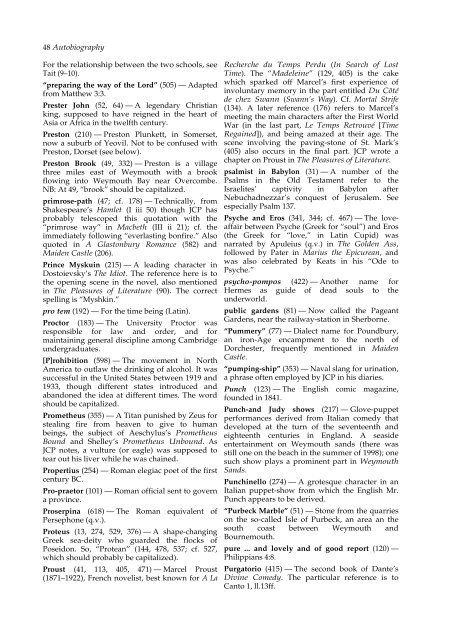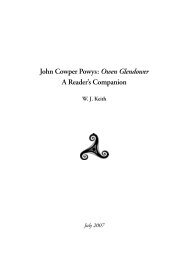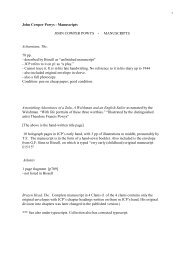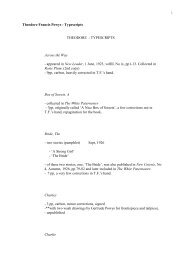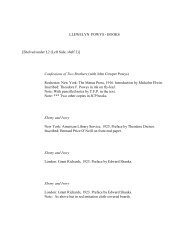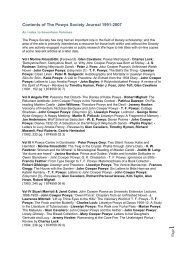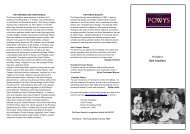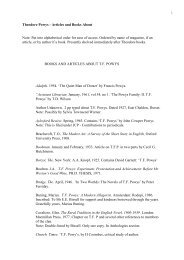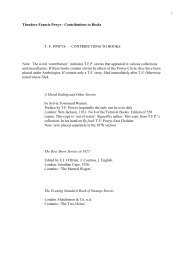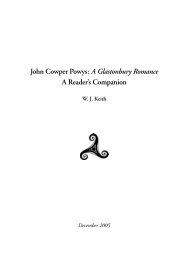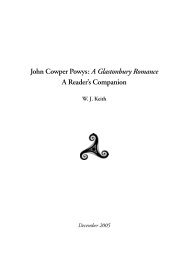J. C. Powys' Autobiography: A Reader's Companion - Site POWYS
J. C. Powys' Autobiography: A Reader's Companion - Site POWYS
J. C. Powys' Autobiography: A Reader's Companion - Site POWYS
Create successful ePaper yourself
Turn your PDF publications into a flip-book with our unique Google optimized e-Paper software.
48 <strong>Autobiography</strong><br />
For the relationship between the two schools, see<br />
Tait (9–10).<br />
“preparing the way of the Lord” (505) — Adapted<br />
from Matthew 3:3.<br />
Prester John (52, 64) — A legendary Christian<br />
king, supposed to have reigned in the heart of<br />
Asia or Africa in the twelfth century.<br />
Preston (210) — Preston Plunkett, in Somerset,<br />
now a suburb of Yeovil. Not to be confused with<br />
Preston, Dorset (see below).<br />
Preston Brook (49, 332) — Preston is a village<br />
three miles east of Weymouth with a brook<br />
flowing into Weymouth Bay near Overcombe.<br />
NB: At 49, “brook” should be capitalized.<br />
primrose-path (47; cf. 178) — Technically, from<br />
Shakespeare’s Hamlet (I iii 50) though JCP has<br />
probably telescoped this quotation with the<br />
“primrose way” in Macbeth (III ii 21); cf. the<br />
immediately following “everlasting bonfire.” Also<br />
quoted in A Glastonbury Romance (582) and<br />
Maiden Castle (206).<br />
Prince Myskuin (215) — A leading character in<br />
Dostoievsky’s The Idiot. The reference here is to<br />
the opening scene in the novel, also mentioned<br />
in The Pleasures of Literature (90). The correct<br />
spelling is “Myshkin.”<br />
pro tem (192) — For the time being (Latin).<br />
Proctor (183) — The University Proctor was<br />
responsible for law and order, and for<br />
maintaining general discipline among Cambridge<br />
undergraduates.<br />
[P]rohibition (598) — The movement in North<br />
America to outlaw the drinking of alcohol. It was<br />
successful in the United States between 1919 and<br />
1933, though different states introduced and<br />
abandoned the idea at different times. The word<br />
should be capitalized.<br />
Prometheus (355) — A Titan punished by Zeus for<br />
stealing fire from heaven to give to human<br />
beings, the subject of Aeschylus’s Prometheus<br />
Bound and Shelley’s Prometheus Unbound. As<br />
JCP notes, a vulture (or eagle) was supposed to<br />
tear out his liver while he was chained.<br />
Propertius (254) — Roman elegiac poet of the first<br />
century BC.<br />
Pro-praetor (101) — Roman official sent to govern<br />
a province.<br />
Proserpina (618) — The Roman equivalent of<br />
Persephone (q.v.).<br />
Proteus (13, 274, 529, 376) — A shape-changing<br />
Greek sea-deity who guarded the flocks of<br />
Poseidon. So, “Protean” (144, 478, 537; cf. 527,<br />
which should probably be capitalized).<br />
Proust (41, 113, 405, 471) — Marcel Proust<br />
(1871–1922), French novelist, best known for A La<br />
Recherche du Temps Perdu (In Search of Lost<br />
Time). The “Madeleine” (129, 405) is the cake<br />
which sparked off Marcel’s first experience of<br />
involuntary memory in the part entitled Du Côté<br />
de chez Swann (Swann’s Way). Cf. Mortal Strife<br />
(134). A later reference (176) refers to Marcel’s<br />
meeting the main characters after the First World<br />
War (in the last part, Le Temps Retrouvé [Time<br />
Regained]), and being amazed at their age. The<br />
scene involving the paving-stone of St. Mark’s<br />
(405) also occurs in the final part. JCP wrote a<br />
chapter on Proust in The Pleasures of Literature.<br />
psalmist in Babylon (31) — A number of the<br />
Psalms in the Old Testament refer to the<br />
Israelites’ captivity in Babylon after<br />
Nebuchadnezzar’s conquest of Jerusalem. See<br />
especially Psalm 137.<br />
Psyche and Eros (341, 344; cf. 467) — The loveaffair<br />
between Psyche (Greek for “soul”) and Eros<br />
(the Greek for “love,” in Latin Cupid) was<br />
narrated by Apuleius (q.v.) in The Golden Ass,<br />
followed by Pater in Marius the Epicurean, and<br />
was also celebrated by Keats in his “Ode to<br />
Psyche.”<br />
psycho-pompos (422) — Another name for<br />
Hermes as guide of dead souls to the<br />
underworld.<br />
public gardens (81) — Now called the Pageant<br />
Gardens, near the railway-station in Sherborne.<br />
“Pummery” (77) — Dialect name for Poundbury,<br />
an iron-Age encampment to the north of<br />
Dorchester, frequently mentioned in Maiden<br />
Castle.<br />
“pumping-ship” (353) — Naval slang for urination,<br />
a phrase often employed by JCP in his diaries.<br />
Punch (123) — The English comic magazine,<br />
founded in 1841.<br />
Punch-and Judy shows (217) — Glove-puppet<br />
performances derived from Italian comedy that<br />
developed at the turn of the seventeenth and<br />
eighteenth centuries in England. A seaside<br />
entertainment on Weymouth sands (there was<br />
still one on the beach in the summer of 1998); one<br />
such show plays a prominent part in Weymouth<br />
Sands.<br />
Punchinello (274) — A grotesque character in an<br />
Italian puppet-show from which the English Mr.<br />
Punch appears to be derived.<br />
“Purbeck Marble” (51) — Stone from the quarries<br />
on the so-called Isle of Purbeck, an area an the<br />
south coast between Weymouth and<br />
Bournemouth.<br />
pure ... and lovely and of good report (120) —<br />
Philippians 4:8.<br />
Purgatorio (415) — The second book of Dante’s<br />
Divine Comedy. The particular reference is to<br />
Canto 1, ll.13ff.


